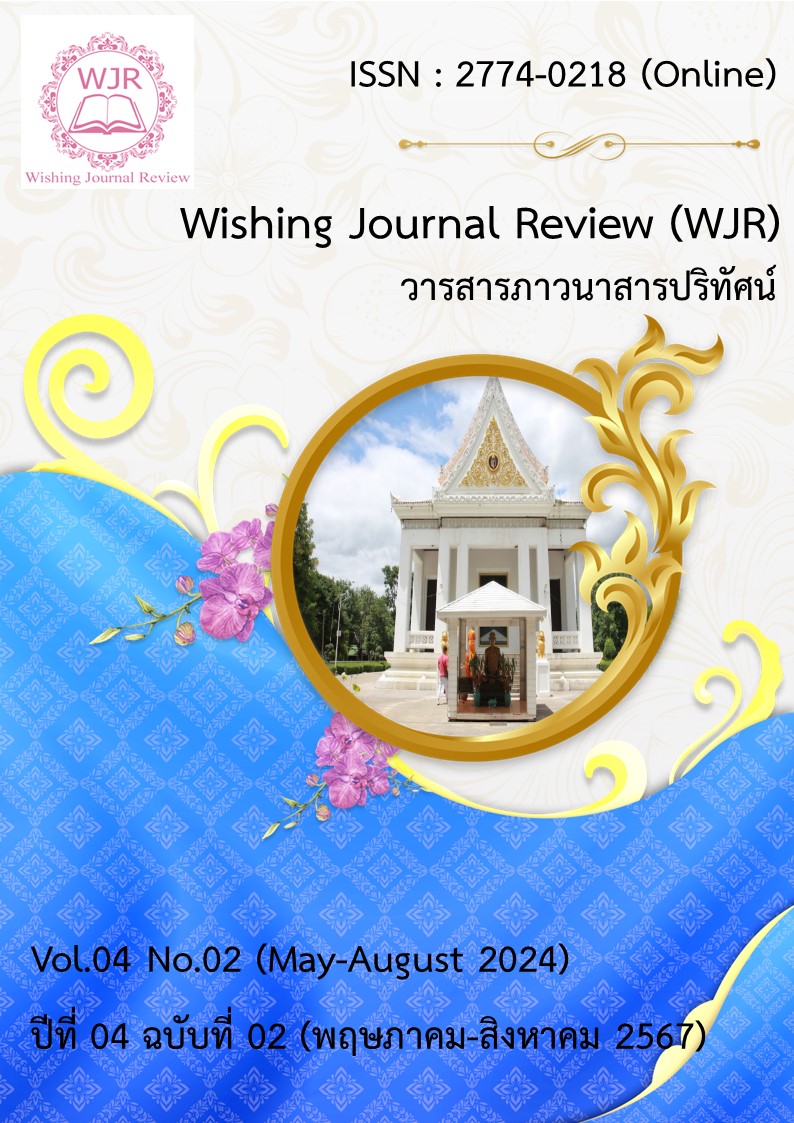Guidelines for Managing Student Activities to Enhance a Meaningful and Valuable way of Life According to the Ikigai Concept of the Students at the Affiliated School of Khlong San District Office Bangkok Metropolitan
Keywords:
Approaches to student affairs management, Living valuable life, Ikigai conceptAbstract
Abstract
It aimed to (1) explore the current and desirable states; (2) examine the strengths, weaknesses, and priority needs; and (3) propose approaches to student affairs management creating a guide to living valuable and meaningful life according to the Ikigai concept among school students under the Khlong San District Office of Bangkok Metropolitan Administration. It employed a quantitative research method which included a sample of school administrators and teachers, totally 140 persons, with 104 respondents accounting for 74.29%. The tool used was a 5 point rating scale questionnaire with IOC value = 1.00 and reliability of .986. For the analysis of priority needs index, informants were 9 experts. The tool used was propriety and feasibility evaluation form as a 5-point rating scale. Research statistics consisted of percentage, mean, standard deviation, and Priority Needs Index Modified.
Research results revealed that the current state of student affairs management creating a guide to living valuable and meaningful life according to the Ikigai concept among school students under the Khlong San District Office of Bangkok Metropolitan Administration, based on the analysis of overall and individual aspects was at a moderate level. The desirable state based on the analysis of overall and individual aspects was at a highest level. The analysis of priority needs for student affairs management suggested that school health was in a low group as strength, while student activities were in a high group as weakness. With respect to a guide to living valuable and meaningful life according to the Ikigai concept, harmony and sustainability was in a low group as strength, while living in the present moment was in a high group as weakness. Regarding the purpose according to the Ikigai concept, the work was in a low group as strength, while the duty was in a high group as weakness the results were taken to determine the following approaches. 1) Developing holistic student activities appropriate for individual differences to allow for discovering and developing self-potential, enhancing life skills, with value and meaning. 1.1) Developing student activities to create diverse experiences, knowledge, and expertise, and happiness in living a sustainable life. 1.2) Developing activities to enhance students' potential according to their aptitudes and interests beneficial to oneself and society. 2) Developing student support and assistance work on promoting, preventing, and solving problems to ensure students living valuable and meaningful life. 2.1) Developing the formulation of a plan to develop the quality of student support and assistance work to ensure students living valuable and meaningful life. 2.2) Developing quality and standard tools for operating student support and assistance work to ensure students living valuable and meaningful life. 2.3) Developing the internal and external involvement by encouraging all sectors to develop knowledge and abilities in operating the support and assistance work to ensure students living valuable and meaningful life. 3) Developing the guidance work to promote students living valuable and meaningful life with the involvement of all parties. 3.1) Developing the guidance work by providing a variety of services and activities to promote students living valuable and meaningful life. 3.2) Developing a guidance system in relation with other works and individuals both inside and outside of school.
The results of this research can be used to formulate policies for educational management to create guidelines for educating learners to see their goals in living a valuable life.
Keywords : Approaches to student affairs management, Living valuable life, Ikigai concept
References
กัลยาณี รัตนบุตร. (2564). รูปแบบการบริหารระบบคุณภาพงานกิจการนักเรียนในสถานศึกษา สังกัดสำนักงานเขตพื้นที่การศึกษาประถมศึกษา. (วิทยานิพนธ์การ
ศึกษาดุษฎีบัณฑิต). สืบค้นจาก https://nuir.lib.nu.ac.th/dspace/bitstream/123456789/4059/3/61030174.pdf.
ณรงค์ อภัยใจ. (2560). รูปแบบการบริหารจัดการศึกษา เพื่อส่งเสริมอาชีพสำหรับเด็กด้อยโอกาส โรงเรียนในโครงการตามพระราชดาริ. (วิทยานิพนธ์ปรัชญาดุษฎี
บัณฑิต มหาวิทยาลัยราชภัฏเชียงใหม่).
ณัฎฐณิชา มิมูนิ. อิคิไกความหมายในการมีชีวิตอยู่ของชาวญี่ปุ่น. (ปริญญาอักษรศาสตรบัณฑิต).
สืบค้นจาก. http://isas.arts.su.ac.th/wp-content/uploads/2561/philosophy/05580663.pdf.
ณัฐพล แสงงาม. (2564). สภาพปัญหาและประสิทธิผลการบริหารกิจการนักเรียนในโรงเรียน สังกัดสำนักงานเขตพื้นที่การศึกษาประถมศึกษาสกลนคร เขต 1.
(วิทยานิพนธ์ครุศาสตรมหาบัณฑิต).สืบค้นจาก https://gsmis.snru.ac.th/e-thesis/file_att1/2022052062421229147_fulltext.pdf.
เนตรนภา คำหนองหว้า. (2560). การพัฒนารูปแบบระบบดูแลช่วยเหลือนักเรียนที่มีประสิทธิผลใน โรงเรียนสังกัดสำนักงานเขตพื้นที่การศึกษาประถมศึกษา
สกลนครเขต 3. (วิทยานิพนธ์ครุศาสตรมหา-บัณฑิต). สืบค้นจาก https://gsmis.snru.ac.th/e-thesis/thesis_detail?r=57421236109.
บุญชม ศรีสะอาด. (2560). การวิจัยเบื้องต้น. (พิมพ์ครั้งที่ 10). กรุงเทพฯ: สุวีริยาสาส์น.
บุณฑริกา อรัณยกานนท์ . (2562). การศึกษาสภาพปัจจุบัน สภาพที่พึงประสงค์ และความต้องการจำเป็นของการบริหารกิจการนักเรียน โรงเรียนนานาชาติเทร็ลล์
ตามแนวคิดการส่งเสริมความยึดมั่นผูกพันของนักเรียน. (วิทยานิพนธ์ครุศาสตรมหาบัณฑิต จุฬาลงกรณ์มหาวิทยาลัย).
มณีกัญญา นากามัทสี. (2564). การศึกษาแนวคิดอิคิไกเพื่อการจัดการทรัพยากรมนุษย์แบบญี่ปุ่น.(วิทยานิพนธ์บริหารธุรกิจมหาบัณฑิต). สืบค้นจาก
https://so06.tci-thaijo.org/index.php/TNIJournalBA/article/download/249513/170904/913343.
มูลนิธิยุวพัฒน์ (2565). [สืบค้นเมื่อ 18 มีนาคม 2566]. อิคิไก ความหมายของการมีชีวิตอยู่. [ออนไลน์]. สืบค้นจาก
https://www.yuvabadhanafoundation.org/th /ข่าวสาร/บทความทั่วไป/อิคิไก-ความหมาย-ชีวิต/.
ยุทธศักดิ์ หินนนท์ . (2557). การศึกษาความพึงพอใจของข้าราชการครูที่มีต่อการบริหารงานกิจการนักเรียน โรงเรียนอนุบาลชุมชนบางบ่อ (ศุภพิพัฒน์รังสีรรค์ )
สำนักงานเขตพื้นที่การศึกษาประถมศึกษาสมุทรปราการเขต 2. สารนิพนธ์ศึกษาศาสตรมหาบัณฑิต สาขาวิชาการบริหารการศึกษา มหาวิทยาลัยนอร์ทกรุงเทพ.
วีรเชษฐ ไชยกุล. (2556). ความคิดเห็นเกี่ยวกับการบริหารงานกิจการนักเรียนของโรงเรียนองค์การบริหารส่วนจังหวัดเชียงราย. (การศึกษาค้นคว้าด้วยตนเองการ
ศึกษามหาบัณฑิต ,สาขาวิชาการบริหารการศึกษา มหาวิทยาลัยพะเยา).
วัฒนาพร ระงับทุกข์, (2563). สมรรถนะเด็กไทยในยุคโลกพลิกผัน (VUCA World). คุรุสภาวิทยาจารย์ JOURNAL OF TEACHER PROFESSIONAL
DEVELOPMENT, 1(1), 8- 18. สืบค้นจากhttps://ph02.tci-thaijo.org/index.php/withayajarnjournal/article/view/240674/163802.
วุฒิชัย กฤษณะประกรกิจ (2561) อ้างถึงใน Ken Mogi (2017). อิคิไก ความหมายของการมีชีวิตอยู่ (The Little Book of Ikigai). (พิมพ์ครั้งที่ 3). กรุงเทพฯ :
สำนักพิมพ์ Move Publishing.
ศรีประภา ชัยสินธพ. (2566). [สืบค้นเมื่อ 18 มีนาคม 2566]. สภาพจิตใจของวัยรุ่น. [ออนไลน์]. สืบค้นจาก
https://www.rama.mahidol.ac.th/ramamental/generaldoctor/06062014-0847.
สำนักการศึกษากรุงเทพมหานคร. (2565). [สืบค้นเมื่อ 23 ตุลาคม 2565]. รายงานสถิติการศึกษา ปีการศึกษา 2565 โรงเรียนสังกัดกรุงเทพมหานคร. เอกสารกลุ่ม
งานแผนงานและสารสนเทศ. สืบค้นจาก https://webportal.bangkok.go.th/user_files/116/22029880963eb2ed68b60f7. 21960405.pdf.
สำนักงานคณะกรรมการการศึกษาขั้นพื้นฐาน กระทรวงศึกษาธิการ (2559). การพัฒนาระบบการดูแล ช่วยเหลือนักเรียน. กรุงเทพฯ: โรงพิมพ์ชุมนุมสหกรณ์
การเกษตรแห่งประเทศไทย จำกัด.
สำนักงานคณะกรรมการพัฒนาระบบราชการ. (ม.ป.ป.). คู่มือเทคนิคและวิธีการบริหารจัดการสมัยใหม่ตามแนวทางการบริหารกิจการบ้านเมืองที่ดี. กรุงเทพฯ:
สำนักงานคณะกรรมการพัฒนาระบบราชการ.
สำนักงานเลขาธิการสภาการศึกษา. 2551. กรอบทิศทางการพัฒนาการศึกษาในช่วงแผนพัฒนาเศรษฐกิจ และสังคมแห่งชาติฉบับที่ 10 (พ.ศ. 2550-2554) ที่
สอดคล้องกับแผนการศึกษาแห่งชาติ (พ.ศ. 2545-2559) ฉบับสรุป. กรุงเทพฯ, โรงพิมพ์แห่งจุฬาลงกรณ์มหาวิทยาลัยสำนักวิชาการและมาตรฐานการศึกษา
สุวิมล ว่องวาณิช. (2558). การวิจัยประเมินความต้องการจำเป็น. (พิมพ์ครั้งที่ 3). กรุงเทพฯ,สำนักพิมพ์แห่งจุฬาลงกรณ์มหาวิทยาลัย.
Cronbach, L.J. (1971). Test Validation. In R. Thorndike (Ed.), Educational Measurement.
Krejcie, R.V., & D.W. Morgan. (1970). “Determining Sample Size for Research Activities”. Educational and Psychological Measurement.
(3) : 607 – 610.
nun (2020). [สืบค้นเมื่อ 25 พฤษภาคม 2566]. สรุปหนังสือ อิคิไก (The Little Book of Ikigai) [ออนไลน์]. สืบค้นจาก
https://medium.com/@CTNL/5the-little-book-of-ikigai-c678abd50750.
Downloads
Published
How to Cite
Issue
Section
License
Copyright (c) 2024 Wishing Journal Review

This work is licensed under a Creative Commons Attribution-NonCommercial-NoDerivatives 4.0 International License.



